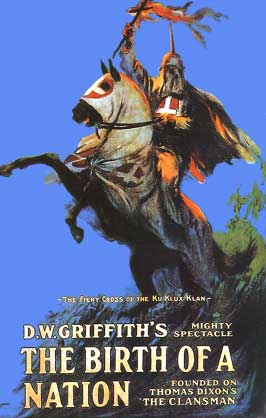| The Birth of a Nation (1915) | |
 A controversial, explicitly racist, but landmark American film masterpiece - these all describe ground-breaking producer/director D. W. Griffith's The Birth of a Nation (1915). The domestic melodrama/epic originally premiered with the title The Clansman in February, 1915 in Los Angeles, California, but three months later was re-titled with the present title at its world premiere in New York, to emphasize the birthing process of the US.
A controversial, explicitly racist, but landmark American film masterpiece - these all describe ground-breaking producer/director D. W. Griffith's The Birth of a Nation (1915). The domestic melodrama/epic originally premiered with the title The Clansman in February, 1915 in Los Angeles, California, but three months later was re-titled with the present title at its world premiere in New York, to emphasize the birthing process of the US. The KKK experienced a revival and membership peak in the decade immediately following its initial release.
KKK March in Washington D.C. 1925

Quote:
"Though men and women drop from the ranks they remain with us in purpose, and can be depended on fully in any crisis. Also, there are millions who have never joined, but who think and feel and -- when called on -- fight with us. This is our real strength, and no one who ignores it can hope to understand America today." Hiram Wesley Evans, The Klan's Fight for Americanism, The North American Review (March-April-May 1926)
1) Interpret the quote in your blog.
2) Explain how this film would have increased the population of the KKK.
No comments:
Post a Comment